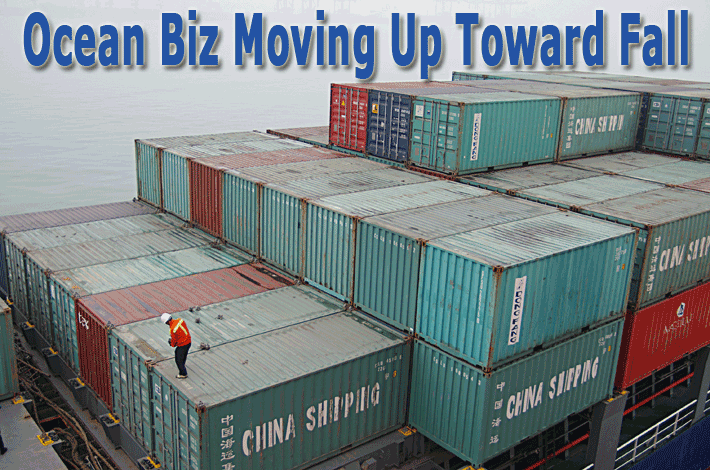Ocean Biz Moving Up Toward Fall

Volumes are picking up on the
East-West container shipping trades and lines are planning major new General
Rate Increases to take advantage of the peak shipping season, despite
most previous GRIs doing little more than giving spot rates a temporary
nudge upwards.
But analysts are now optimistic that container
shipping supply and demand is getting closer to equilibrium which could
see a more long-term correction in rates over the next two years.
On the key Asia-Europe trade, the recipient
of global fleet additions in the 13,000 TEU+ capacity class in recent
years, lines are continuing their quest to use regular GRIs to force up
rates.
According to the latest Shanghai Containerized
Freight Index (SCFI), GRIs introduced by most lines at the start of the
month initially found some traction in the form of rate hikes.
But these gains were subsequently lost with
indecent haste as the month wore on and individual lines chased volumes
with capacity additions and low rate offers.
As of mid-August, spot rates were hovering
around $1,200 per TEU, some 10% percent lower than a year earlier.
The rates drop prompted the normal response
from lines – the announcement of further GRI and rate restoration
programs. OOCL, for example, will introduce a rate restoration levy on
Asia-Europe services of US$675 per TEU starting September 1.
The Trans-Pacific trade from Asia to the
U.S. has a somewhat different dynamic due to fears of union action at
West Coast ports by longshoremen.
As FlyingTypers went to press,
West Coast employers represented by the Pacific Maritime Association were
still in negotiations over a new labor contract with the powerful International
Longshore and Warehouse Union.
The previous contract expired on July 1
but, expecting problems, shippers have been planning far ahead and many
brought forward shipments this year ushering in an early peak season.
The upshot of this is expected to result,
according to the latest Global Port Tracker report from the National Retail
Federation and Hackett Associates, in imports to the U.S. setting a new
record in August of 1.54 million TEU, up from the previous record set
in July at an estimated 1.53 million boxes.
 “The
negotiations appear to be going well, but each week that goes by makes
the situation more critical as the holiday season approaches,” said
Jonathan Gold, NRF Vice President for Supply Chain and Customs Policy. “The
negotiations appear to be going well, but each week that goes by makes
the situation more critical as the holiday season approaches,” said
Jonathan Gold, NRF Vice President for Supply Chain and Customs Policy.
“Retailers are making sure they are
stocked up so shoppers won’t be affected regardless of what happens
at the ports.”
According to SCFI, spot rates from Shanghai
to the U.S. west coast were running at around 2,100 per FEU in mid-August,
up from $1,941 a year earlier. Even so, lines still plan further ‘rate
restoration’ programs.
After member container shipping lines in
the Transpacific Stabilization Agreement added a GRI of at least $600
per FEU on August 1, the TSA has now recommended a further GRI of at least
$600 per FEU to be implemented at the start of September to help carriers
maintain “adequate service levels over time.”
But while lines and their customers tussle
over spot rates, there now appears a discernible, fundamental shift in
the container slot supply-demand balance. Whisper it quietly, but aided
by improving demand for Asian products from Europe and the U.S., and more
responsible capacity management, the outlook is finally starting to look
better for lines, both in the near and medium-term.
Although excess capacity is still capping
Asia-Europe rates, a number of lines including OOCL and Maersk saw improved
profits and volumes in the second quarter, with bottom lines boosted by
more efficient ships and resultant improved bunker usage efficiency.
 There
is more good news for lines in most analyst’s forecasts on supply
and demand. Although there is a backlog of excess capacity for lines to
work through, Peter Sand, Chief Shipping Analyst at Bimco, believes demand-side
growth is outstripping supply-side growth now, improving the fundamental
balance of the market. “This difference is 1-2% percent. Not a landslide
change from one day to the next, but a most welcome move in the right
direction,” he said. There
is more good news for lines in most analyst’s forecasts on supply
and demand. Although there is a backlog of excess capacity for lines to
work through, Peter Sand, Chief Shipping Analyst at Bimco, believes demand-side
growth is outstripping supply-side growth now, improving the fundamental
balance of the market. “This difference is 1-2% percent. Not a landslide
change from one day to the next, but a most welcome move in the right
direction,” he said.
Research by Drewry Shipping Consultants
found that the number of containerships afloat decreased in the first
half of 2014 and could fall over the full year—for the first time
in over 20 years!
“Although the total TEU nominal capacity
of the global fleet continues to increase by about 6% percent a year,
this growth in capacity now comes solely from the increase in average
ship size, not from having more ships,” said the analyst.
“Not only are ships getting bigger—not
unexpected—but also both the absolute number and the relative market
share of smaller ships are falling.”
Clarksons expects volumes to increase globally
by 6% in 2014 and 6.7% percent in 2015 compared to a slot capacity increase
of 4.8% percent this year when supply growth has been limited by “elevated
levels of scrapping.”
And Braemar ACM Shipbroking said high demolition
levels had restrained newbuilding orders so far in 2014. Along with shrewd
fleet management, this will mean fleet growth in 2016 of only 3% percent
given that orders placed now will only be delivered in 2017.
With global container demand expected to
increase by 18% percent through to 2016, a figure expected to be roughly
matched by supply side expansion of slot capacity, the market, from a
liner perspective at least, is starting to look a lot more promising.
SkyKing
 |
|






